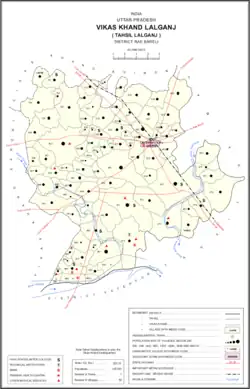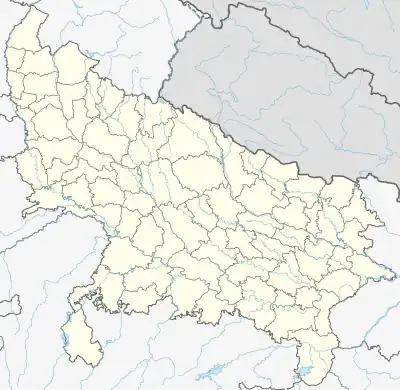Narsinghpur, Raebareli
Narsinghpur is a village in Lalganj block of Rae Bareli district, Uttar Pradesh, India.[2] It is located 5 km from Lalganj, the block and tehsil headquarters.[3] As of 2011, it has a population of 655 people, in 108 households.[2] It has 1 primary school and no healthcare facilities, and it does not host a permanent market or a weekly haat.[2] It belongs to the nyaya panchayat of Mubarakpur.[4]
Narsinghpur | |
|---|---|
Village | |
 Map showing Narsinghpur (#819) in Lalganj CD block | |
 Narsinghpur Location in Uttar Pradesh, India | |
| Coordinates: 26.188174°N 80.918953°E[1] | |
| Country | |
| State | Uttar Pradesh |
| District | Raebareli |
| Area | |
| • Total | 0.936 km2 (0.361 sq mi) |
| Population (2011)[2] | |
| • Total | 655 |
| • Density | 700/km2 (1,800/sq mi) |
| Languages | |
| • Official | Hindi |
| Time zone | UTC+5:30 (IST) |
| Vehicle registration | UP-35 |
The 1951 census recorded Narsinghpur as comprising 1 hamlet, with a total population of 291 people (139 male and 152 female), in 49 households and 47 physical houses.[5] The area of the village was given as 236 acres.[5] 20 residents were literate, all male.[5] The village was listed as belonging to the pargana of Khiron and the thana of Sareni.[5]
The 1961 census recorded Narsinghpur as comprising 1 hamlet, with a total population of 316 people (143 male and 173 female), in 68 households and 55 physical houses.[6] The area of the village was given as 236 acres.[6]
The 1981 census recorded Narsinghpur as having a population of 484 people, in 78 households, and having an area of 95.51 hectares.[3] The main staple foods were listed as wheat and rice.[3]
The 1991 census recorded Narsinghpur as having a total population of 484 people (217 male and 267 female), in 83 households and 83 physical houses.[4] The area of the village was listed as 94 hectares.[4] Members of the 0-6 age group numbered 103, or 21% of the total; this group was 48% male (49) and 52% female (54).[4] Members of scheduled castes made up 39% of the village's population, while no members of scheduled tribes were recorded.[4] The literacy rate of the village was 31% (91 men and 59 women).[4] 135 people were classified as main workers (106 men and 29 women), while 0 people were classified as marginal workers; the remaining 349 residents were non-workers.[4] The breakdown of main workers by employment category was as follows: 59 cultivators (i.e. people who owned or leased their own land); 58 agricultural labourers (i.e. people who worked someone else's land in return for payment); 0 workers in livestock, forestry, fishing, hunting, plantations, orchards, etc.; 0 in mining and quarrying; 1 household industry worker; 7 workers employed in other manufacturing, processing, service, and repair roles; 1 construction worker; 1 employed in trade and commerce; 2 employed in transport, storage, and communications; and 6 in other services.[4]
References
- "GeoNames Search". geonames.nga.mil. Archived from the original on 12 April 2014.
- "Census of India 2011: Uttar Pradesh District Census Handbook - Rae Bareli, Part A (Village and Town Directory)" (PDF). Census 2011 India. pp. 288–306. Retrieved 19 October 2021.
- Census 1981 Uttar Pradesh: District Census Handbook Part XIII-A: Village & Town Directory, District Rae Bareli (PDF). 1982. pp. 132–3. Retrieved 20 October 2021.
- Census 1991 Series-25 Uttar Pradesh Part-XII B Village & Townwise Primary Census Abstract District Census Handbook District Raebareli (PDF). 1992. pp. xxiv–xxviii, 188–9. Retrieved 20 October 2021.
- Census of India, 1951: District Census Handbook Uttar Pradesh (42 - Rae Bareli District) (PDF). Allahabad. 1955. pp. 114–5. Retrieved 20 October 2021.
{{cite book}}: CS1 maint: location missing publisher (link) - Census 1961: District Census Handbook, Uttar Pradesh (39 - Raebareli District) (PDF). Lucknow. 1965. pp. lxvi-lxvii of section "Dalmau Tahsil". Retrieved 20 October 2021.
{{cite book}}: CS1 maint: location missing publisher (link)